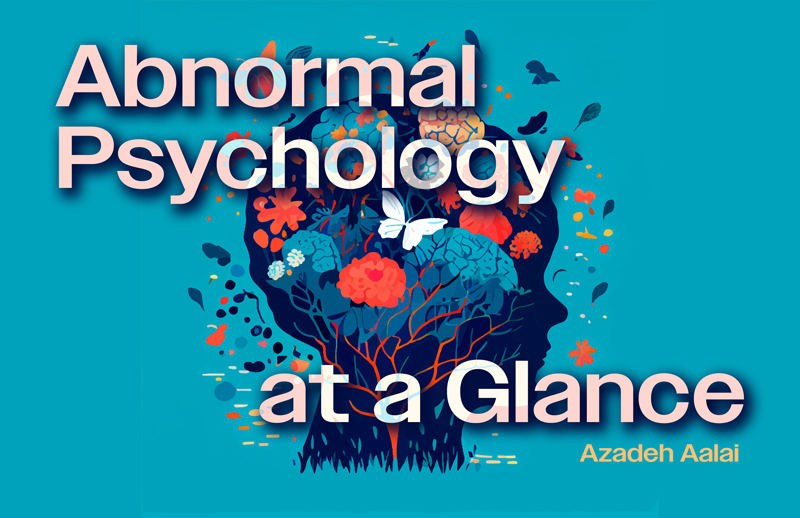Abnormal Psychology at a Glance
Author(s): Azadeh Aalai
Edition: 1
Copyright: 2024
Abnormal Psychology at a Glance provides an in-depth analysis of the major topics within the field of abnormal psychology, with a strong emphasis on the role of environment and culture in impacting mental health and/or illness. Challenging the traditional psychiatric model of abnormality, this text offers a complex and interactive etiological explanation for mental illness, identifying the shared role of biology, environment, and specific exposures in a person's history, such as family dynamics, potential trauma, and more recent cultural staples such as technology and social media in the development of mental health and/or illness. An overarching theme of each chapter is a critical analysis of the role that ever-changing cultural influences is playing on rates of mental illness, with a strong emphasis on individual relationships with digital technology, such as social media.
The history of stigma surrounding mental illness is an additional overarching theme for this text, with an emphasis on how self-stigma and common stereotypes about the mentally ill could serve to undermine willingness to seek help for those who are most in need. The dearth of mental health resources, and the disparities regarding access to care based on socio-economic status, sex, gender and race and ethnicity are also explored. An intersectional lens is offered regarding the way that symptoms of mental illness may manifest differently, based on other aspects of the person's identity who may be struggling mentally, such as their sex or gender identity.
Embedded videos in each chapter enhance learning, with flashcards offering definitions of critical terms at the end of each chapter giving students the opportunity to review key features of each topic. Lastly, end of chapter quizzes gives students the opportunity to study material from each chapter and test their knowledge before moving on to the next unit.
Chapter 1: What is Abnormality?
Chapter 2: The Dark History of Psychiatry
Chapter 3: Schools of Thought/Therapeutic Models
Chapter 4: Anxiety-Related Disorders
Chapter 5: Disorders of Trauma & Stress
Chapter 6: Mood Disorders
Chapter 7: Suicide
Chapter 8: Personality Disorders
Chapter 9: Schizophrenia
Chapter 10: Dissociative Disorders
Chapter 11: Addiction
Chapter 12: Eating Disorders
Dr. Aalai, PhD, is an Associate Professor with Tenure at Queensborough Community College, City University of New York (CUNY). She also serves as an Adjunct Professor for the M.A. program in Psychology at New York University (NYU). She is a regular contributor for Psychology Today, in addition to her expertise being featured in publications such as Rolling Stone, and the Washington Post. Her work has been published in peer-reviewed, academic journals. She has also been featured on programming for NPR, Impact by Nightline, Good Morning America (ABC), A&E, and Investigative Discovery. Dr. Aalai’s research pursuits include Holocaust education, genocide studies, media studies, and mass atrocity/genocide prevention, peacebuilding & conflict resolution. She currently resides in Brooklyn, NY.
Abnormal Psychology at a Glance provides an in-depth analysis of the major topics within the field of abnormal psychology, with a strong emphasis on the role of environment and culture in impacting mental health and/or illness. Challenging the traditional psychiatric model of abnormality, this text offers a complex and interactive etiological explanation for mental illness, identifying the shared role of biology, environment, and specific exposures in a person's history, such as family dynamics, potential trauma, and more recent cultural staples such as technology and social media in the development of mental health and/or illness. An overarching theme of each chapter is a critical analysis of the role that ever-changing cultural influences is playing on rates of mental illness, with a strong emphasis on individual relationships with digital technology, such as social media.
The history of stigma surrounding mental illness is an additional overarching theme for this text, with an emphasis on how self-stigma and common stereotypes about the mentally ill could serve to undermine willingness to seek help for those who are most in need. The dearth of mental health resources, and the disparities regarding access to care based on socio-economic status, sex, gender and race and ethnicity are also explored. An intersectional lens is offered regarding the way that symptoms of mental illness may manifest differently, based on other aspects of the person's identity who may be struggling mentally, such as their sex or gender identity.
Embedded videos in each chapter enhance learning, with flashcards offering definitions of critical terms at the end of each chapter giving students the opportunity to review key features of each topic. Lastly, end of chapter quizzes gives students the opportunity to study material from each chapter and test their knowledge before moving on to the next unit.
Chapter 1: What is Abnormality?
Chapter 2: The Dark History of Psychiatry
Chapter 3: Schools of Thought/Therapeutic Models
Chapter 4: Anxiety-Related Disorders
Chapter 5: Disorders of Trauma & Stress
Chapter 6: Mood Disorders
Chapter 7: Suicide
Chapter 8: Personality Disorders
Chapter 9: Schizophrenia
Chapter 10: Dissociative Disorders
Chapter 11: Addiction
Chapter 12: Eating Disorders
Dr. Aalai, PhD, is an Associate Professor with Tenure at Queensborough Community College, City University of New York (CUNY). She also serves as an Adjunct Professor for the M.A. program in Psychology at New York University (NYU). She is a regular contributor for Psychology Today, in addition to her expertise being featured in publications such as Rolling Stone, and the Washington Post. Her work has been published in peer-reviewed, academic journals. She has also been featured on programming for NPR, Impact by Nightline, Good Morning America (ABC), A&E, and Investigative Discovery. Dr. Aalai’s research pursuits include Holocaust education, genocide studies, media studies, and mass atrocity/genocide prevention, peacebuilding & conflict resolution. She currently resides in Brooklyn, NY.

